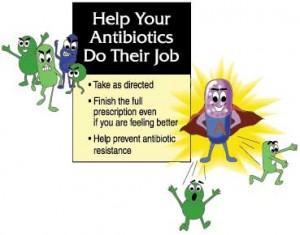The FDA wants you to be aware of the growing problem of Antibiotic Resistance. The following information comes directly from the FDA literature on the subject.
Antibiotic drugs can save lives. But some germs get so strong that they can resist the drugs. The drugs don’t work as well. Germs can even pass on resistance to other germs.
 Antibiotic drugs normally work by killing germs called bacteria, or they stop the bacteria from growing. However, sometimes not all of them are stopped or killed. The strongest ones are left to grow and spread. A person can get sick again. This time the germs are harder to kill.
Antibiotic drugs normally work by killing germs called bacteria, or they stop the bacteria from growing. However, sometimes not all of them are stopped or killed. The strongest ones are left to grow and spread. A person can get sick again. This time the germs are harder to kill.
The more often a person uses an antibiotic, the more likely it is that the germs will resist it. This can make some diseases very hard to control. It can make you and your children sick longer and require more doctor visits. You may need to take drugs that are even stronger.
There are Two Main Types of Germs
Bacteria and viruses are the two main types of germs. They cause most illnesses. Antibiotics can kill bacteria, but they do not work against viruses. Viruses cause:• Colds • Coughs• Sore throats • Flu• Bronchitis • Sinus problems• Ear infections
Bacteria live in drinking water, food, and soil. They live in plants, animals, and people. Most of them do not hurt people. Some even help us to digest food. But other bacteria cause serious diseases such as tuberculosis (TB) and Lyme disease.
How Does this Affect Me?
If you have a virus, taking antibiotics is not a good idea. Antibiotics don’t work against viruses. The medicine will not help you. It might even harm you. Each time you take one, you add to the chances that bacteria in your body will be able to resist them. Later that could make you very sick. Finding the right treatment could be a problem.
What Common Mistakes Do Patients Make?
• Patients ask for antibiotics they don’t need. For example, they ask for antibiotics to treat a cold.
• They don’t take antibiotics the way the doctor says. For example, they stop taking the drug before all the pills are used. That can leave the strongest germs to grow.
• They save antibiotics and take them on their own later
What is the FDA Doing About the Problem?
The FDA wants doctors to be more careful about giving antibiotics when they are not needed.
• The FDA will require new labeling for doctors.
• One of the new labels must say that these drugs should be used only for infections caused by bacteria.
• Another label will ask doctors to explain to their patients the right way to use the drugs.
What Should I Do?
• Don’t demand an antibiotic when your doctor says you don’t need it.
• Don’t take an antibiotic for a virus (cold, cough, or flu).
• Take your medicine exactly the way the doctor says. Don’t skip doses.
• Don’t stop taking your medicine when you feel better. Take all the doses.
• Don’t take leftover medicine.
• Don’t take someone else’s medicine.
• Don’t rely on antibacterial products (soaps, detergents, and lotions). There is no proof that these products really help.

